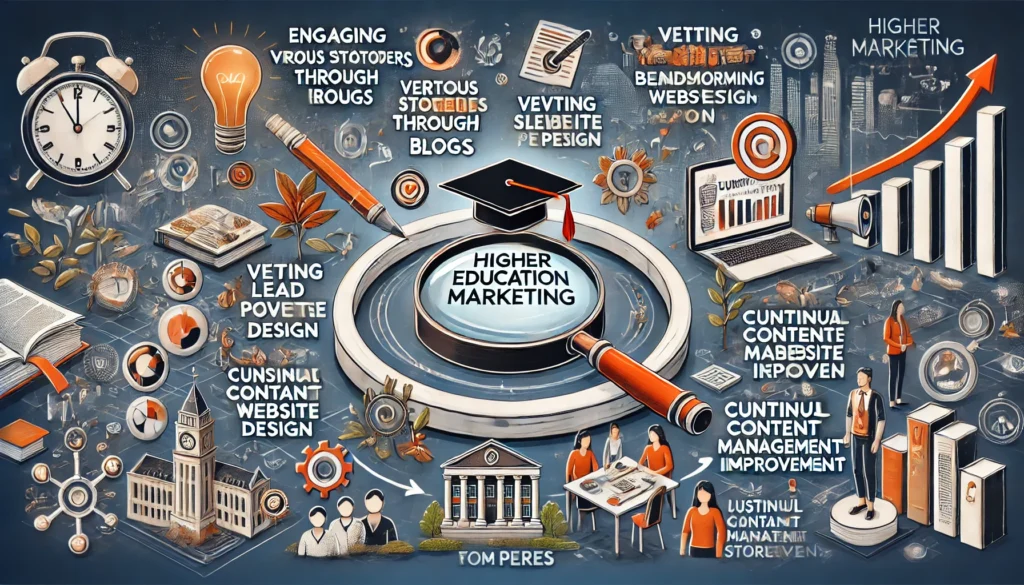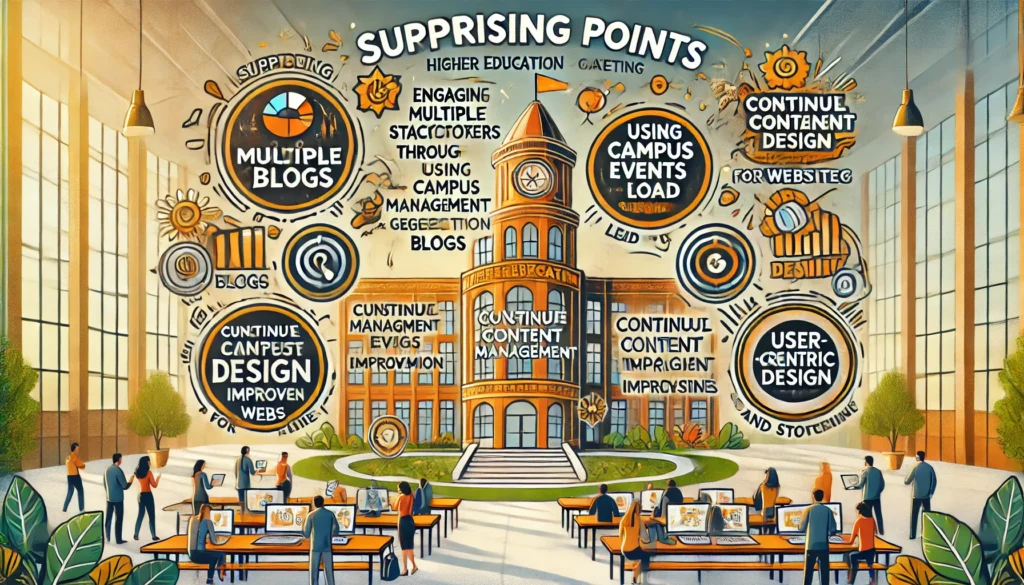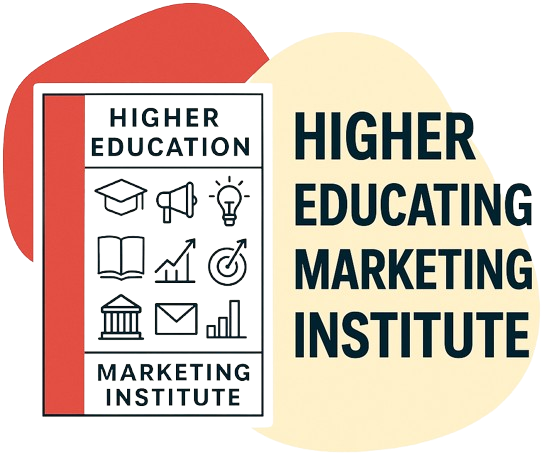Common themes:
- Importance of Digital Marketing Tools:
- Blogging, content management systems (CMS), and SEO as essential for marketing success.
- Leveraging data and analytics to improve marketing strategies.
- Targeted and Personalized Content:
- Personalization and relevancy in content creation.
- Tailoring marketing efforts to specific audiences (students, alumni, etc.).
- Optimization and Continuous Improvement:
- Importance of regular updates and optimizations (websites, content, strategies).
- Continuous data collection and analysis to enhance performance.
- Lead Generation and Conversion:
- Strategies to attract, engage, and convert prospective students or customers.
- Emphasis on optimizing user experience and calls-to-action.
Surprising points:
- Educational Blogging:
- Engaging not just students, but parents, alumni, and other stakeholders through blogs.
- Using a mix of evergreen and timely content.
- Lead Generation:
- Importance of vetting internet lead providers.
- Campus events as a significant source of leads.
- Graduate Marketing:
- Benchmarking against peer institutions and industry standards.
- Aligning marketing goals with overall institutional goals.
- Content Management:
- Implementing CMS platforms like WordPress and Drupal for efficiency.
- The ongoing nature of content management requiring continuous improvement.
- University Website Optimization:
- Emphasis on user-centric design for increasing conversions.
- Utilizing analytics and feedback tools for performance tracking.
- Content Marketing:
- Focus on customer-centric content and storytelling.
- Challenges of content overload and standing out from the competition.

Educational Content Marketing: Unlock The Power Of Blogging
Higher Education Marketing
Synopsis:
- The article discusses the importance of blogging in educational marketing and how it can benefit educational institutions.
- It highlights the potential of blogging to attract and engage prospective students, establish thought leadership, and strengthen brand recognition.
- Blogging helps in building trust, increasing website traffic, and improving SEO rankings.
- The article provides examples of successful educational blogs and offers tips for creating engaging content, optimizing posts for search engines, and promoting blogs on social media.
- It emphasizes the need for consistent and regular blogging with a focus on relevant and valuable content to achieve the desired results.
- The author also addresses common challenges faced in educational blogging, such as generating ideas and maintaining a consistent publishing schedule.
- Several background resources are cited throughout the article, including statistics, case studies, and external articles from reputable sources.
Unique or Noteworthy Positions:
- The article highlights the power of educational blogging to not only attract prospective students but also to engage parents, alumni, and other stakeholders.
- It emphasizes the need for educational institutions to incorporate blogging as a strategic marketing tool and invest in developing a robust content marketing strategy.
- The author suggests using a mix of evergreen and timely content to cater to different audience needs and interests.
Summary and Takeaways:
- Blogging plays a crucial role in educational marketing by attracting and engaging prospective students, establishing thought leadership, and enhancing brand visibility.
- Educational institutions should invest in creating valuable content regularly and optimizing posts for search engines to maximize the impact of blogging.
- Successful educational blogs provide relevant and valuable content, incorporate multimedia elements, and leverage social media for promotion.
- Consistency and quality are key in educational blogging, and overcoming challenges such as idea generation and maintaining a regular publishing schedule is essential.
- A well-executed educational blog can drive website traffic, improve search engine rankings, strengthen brand recognition, and ultimately contribute to student recruitment and retention.
“📚💡 Unlock educational blogging! 🖥️📝 Attract students, boost recognition, and enhance thought leadership. 🎓👩🎓 #EducationMarketing #BloggingTips”
Tweet

6 Common Grad and Adult Lead Gen Sources Demystified
EAB
Synopsis:
- The article explores six common lead generation sources for graduate and adult education programs.
- It provides insights into each source, including their advantages, limitations, and best practices.
- The author emphasizes the need for a diversified lead generation strategy to maximize enrollment success.
- Unique positions taken by the author include highlighting the benefits and challenges of each source.
Background resources cited in the article:
- Internal data and analysis from EAB research.
Noteworthy positions taken by the author:
- High-quality internet lead providers offer a valuable source of prospective students but require careful vetting.
- Social media advertising provides a cost-effective way to reach a targeted audience but may require ongoing optimization.
- Campus events can be a powerful source of lead generation but should focus on showcasing program value and fostering connections.
Summary and takeaways:
- The article provides insights into common lead generation sources used by graduate and adult education programs.
- It emphasizes the importance of diversifying lead generation strategies to maximize enrollment.
- It offers practical advice for leveraging each source while highlighting their benefits and limitations.
- The author underscores the need for ongoing evaluation and optimization to maintain effective lead generation.
- Takeaways include the significance of vetting internet lead providers, optimizing social media advertising, and leveraging events as valuable lead generation sources.
“🎓 Unravel lead generation for grad and adult education! Tips for success. Diversify and optimize. #HigherEd #LeadGen”
Tweet
Grad Marketing Benchmarks and Forecasting
Carnegie—Higher Ed Marketing & Enrollment
https://www.carnegiehighered.com/blog/grad-marketing-benchmarks-and-forecasting
Synopsis:
- This article discusses the importance of using marketing benchmarks and forecasting in graduate education institutions.
- It emphasizes the need for continuous data collection and analysis to enhance marketing strategies and improve enrollment outcomes.
- The author highlights the benefits of benchmarking against peer institutions and industry standards.
- Various marketing metrics, such as website traffic, conversion rates, and cost per lead, are explained in the context of graduate education marketing.
- The article also touches on the challenges of accurate forecasting in a dynamic and competitive market.
Background Resources:
- The article does not cite any background resources.
Unique/Noteworthy Positions:
- The author emphasizes the significance of benchmarking against peer institutions and competitors to understand marketing performance.
- It suggests that graduate education institutions should adopt a data-driven approach and invest in technologies that facilitate ongoing data collection and analysis.
- The article argues for the alignment of marketing goals with overall institutional goals, such as increasing enrollment and improving student success.
Summary & Takeaways:
- Marketing benchmarks and forecasting are essential for graduate education institutions to enhance marketing strategies and achieve enrollment goals.
- Continuous data collection and analysis, benchmarking against peer institutions, and using industry standards are crucial elements of effective marketing.
- Understanding key marketing metrics, such as website traffic, conversion rates, and cost per lead, helps optimize marketing efforts.
- Accurate forecasting in a dynamic market can be challenging, requiring careful analysis of historical data, market trends, and competitive factors.
- Institutions should prioritize data-driven decision-making and invest in technology that facilitates data collection and analysis.
“Graduate institutions must use benchmarks 📈 and forecasting 🔍 to improve enrollment 🎓📊💼 #HigherEdMarketing #DataDrivenDecisionMaking”
Tweet

Content Management: What is it and Why is it Important?
hannonhill.com
https://www.hannonhill.com/blog/content-management.html
Synopsis:
- The article explores the concept of content management and its significance in the digital era.
- Content management refers to the process of organizing, storing, and distributing content effectively.
- It discusses the challenges businesses face in managing content and the benefits of implementing a content management system (CMS).
- The author emphasizes the importance of content management in achieving organization, collaboration, and efficiency in content creation and distribution.
- The article cites examples of popular CMS platforms like WordPress and Drupal as effective tools for content management.
- It provides practical tips for businesses to improve their content management practices, including content audits, user-focused content creation, and the use of metadata.
- The author highlights the role of effective content management in enhancing customer experience, optimizing SEO, and increasing website traffic.
- The article concludes with a reminder that content management is an ongoing process that requires dedication and continuous improvement.
Takeaways:
- Content management is crucial for businesses to organize, store, and distribute content effectively.
- Implementing a content management system (CMS) can address challenges in content management.
- Effective content management enhances organization, collaboration, and efficiency in content creation and distribution.
- Popular CMS platforms like WordPress and Drupal offer powerful tools for content management.
- Practical tips include content audits, user-focused content creation, and the use of metadata.
- Effective content management improves customer experience, SEO, and website traffic.
- Content management requires ongoing dedication and continuous improvement.
“💡 Effective content management ensures efficient, organized content creation. Use WordPress or Drupal! 📝✨ #ContentManagement #CMS”
Tweet
Optimizing Your University Website for Maximum Conversions
EducationDynamics
https://www.educationdynamics.com/optimizing-university-website-maximum-conversions
Synopsis:
- In this article, the author discusses the importance of optimizing university websites to maximize conversions and achieve desired outcomes.
- The author emphasizes the significance of a university website as a key marketing tool, highlighting the need to create a user-friendly experience that leads to conversions.
- Various factors that can impact website conversions are explored, including design, content, navigation, and calls-to-action.
- The author provides practical tips and strategies for optimizing different elements of a university website to increase conversions, such as using compelling headlines, incorporating clear and concise content, utilizing responsive design, and implementing effective calls-to-action.
- The article also offers insights on leveraging analytics and feedback to track and improve website performance, as well as the importance of continuous testing and optimization.
Background Resources:
- No specific background resources are cited in the article.
- However, the author mentions the use of web analytics and feedback tools for website optimization.
Unique or Noteworthy Positions:
- The author highlights the significance of a university website as a powerful marketing tool that can directly impact conversions and student acquisition.
- The article emphasizes the importance of user-centric design and providing a seamless experience to website visitors in order to increase conversions.
Summary and Takeaways:
- Optimizing university websites for maximum conversions is crucial for achieving desired outcomes and increasing student acquisition.
- Key factors that impact website conversions include design, content quality, navigation, and calls-to-action.
- Practical tips and strategies for optimizing different elements of a university website are provided, such as using compelling headlines, clear and concise content, responsive design, and effective calls-to-action.
- Leveraging web analytics and feedback tools can help track and improve website performance, while continuous testing and optimization are essential for ongoing success.
“🎓🌐 Higher ed marketing: Optimize your website to boost conversions and student acquisition! #HigherEdMarketing #WebsiteOptimization”
Tweet

Content Marketing: A Key Strategy for Business Growth and Success
hannonhill.com
https://www.hannonhill.com/blog/content-marketing.html
Outline:
- Introduction:
- The importance of content marketing for business growth and success.
- How content marketing can help businesses establish their authority and attract customers.
- Key principles of content marketing:
- Creating valuable and relevant content.
- Understanding the target audience and their needs.
- Using storytelling and engaging formats.
- Leveraging SEO and social media.
- Benefits of content marketing:
- Establishing brand authority and credibility.
- Increasing organic website traffic and search engine rankings.
- Building and nurturing customer relationships.
- Boosting lead generation and conversions.
- Generating cost-effective and long-lasting results.
- Challenges and solutions in content marketing:
- Overcoming content overload and standing out from the competition.
- Developing a strong content strategy and consistent execution.
- Measuring and analyzing content performance.
- Adapting to evolving trends and consumer preferences.
- Noteworthy positions taken by the author:
- Emphasizing the importance of customer-centric content and storytelling.
- Highlighting the need for data-driven analysis and optimization.
- Takeaways:
- Content marketing is a critical strategy for business growth and success.
- Creating valuable and relevant content attracts and retains customers.
- Consistent execution, data analysis, and adaptation are key to content marketing success.
“📢 Content marketing is the 🗝️ to business 💥! Use valuable, data-driven content to convert. #ContentMarketing #BusinessGrowth”
Tweet




